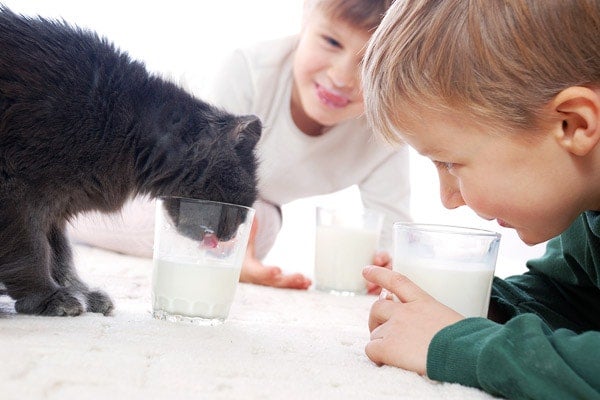
Two cups of milk a day ideal for children’s health, study shows
Published: December 17, 2012
New research from the University of Toronto answers one of the most common questions parents ask their doctors: How much milk should I be giving my children?
The answer is two cups per day.
And while too little milk is a problem, so is too much, the study found.
“We started to research the question because professional recommendations around milk intake were unclear and doctors and parents were seeking answers,” said Professor Jonathon Maguire of the Department of Paediatrics and Institute of Health of Policy, Management and Evaluation.
Maguire and his team looked at how cow’s milk affected body stores of iron and vitamin D in more than 1,300 children aged two to five years. They found that children who drank more than half a litre of cow’s milk per day had higher Vitamin D stores but lower iron stores. Low iron can lead to anemia, or too few of the red blood cells needed to carry oxygen throughout the body, and iron deficiency can compromise cognitive development in young children, research shows.
“We saw that two cups of cow’s milk per day was enough to maintain adequate vitamin D levels for most children, while also maintaining iron stores. With additional cow’s milk, there was a further reduction in iron stores without greater benefit from vitamin D,” said Maguire, who is also a pediatrician at St. Michael’s Hospital.
The exact cause of the drop in iron stores is not clear but may result from children filling up on milk instead of consuming adequate amounts of iron-rich solid foods.
The journal Pediatrics published the results online Dec 17.
The researchers recruited healthy children during routine doctors’ appointments between 2008 and 2010. Parents were asked to fill out an extensive questionnaire about their children’s milk drinking habits and other factors that could affect iron and Vitamin D stores. A blood sample was obtained from each child to determine body stores of iron and Vitamin D.
The study also found that children with darker skin pigmentation may not have enough vitamin D stores during the winter months. Maguire suggested that instead of consuming more milk to increase these levels, wintertime vitamin D supplementation may be a more appropriate way of increasing vitamin D stores while preserving iron stores.
“Vitamin D deficiency in children has been linked to bone health issues and iron deficiency has been linked to anemia and delays in cognitive development,” Maguire said. “Being able to answer parent’s questions about healthy cow’s milk intake is important to avoiding these potentially serious complications of low vitamin D and iron stores.”
The Canadian Paediatric Society recommends that cow’s milk not be started before one year of age.
The study was part of TARGet Kids!, a collaboration between children’s doctors and researchers from St. Michael’s Hospital and The Hospital for Sick Children, and was funded in part by the Canadian Institutes of Health Research and the St. Michael’s Hospital Foundation.



